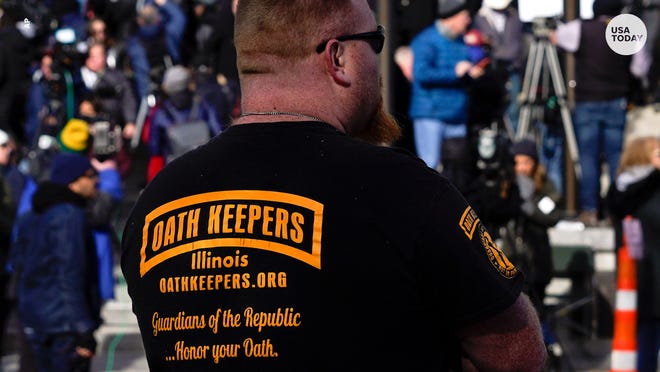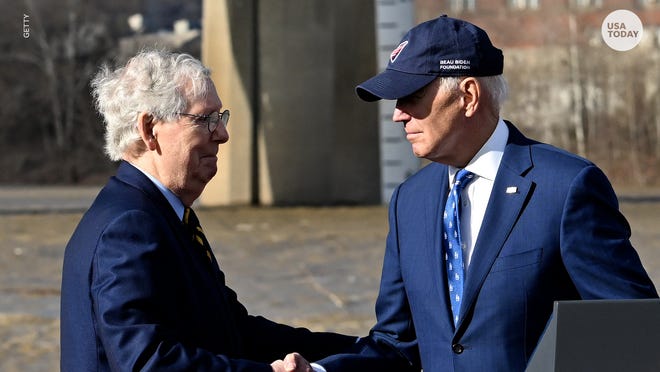
Oath Keepers founder Stewart Rhodes was found guilty of seditious conspiracy and other charges tied to his role in the Jan. 6, 2021, attack on the U.S. Capitol.
Rhodes and four co-defendants – Jessica Watkins, Thomas Caldwell and Kelly Meggs and Ken Harrelson – were convicted by a Washington, D.C., jury Tuesday. Meggs was the only other defendant found guilty of seditious conspiracy.
Prosecutors painted the Oath Keepers on trial as ringleaders of the pro-Trump mob that stormed the Capitol on Jan. 6, resulting in multiple deaths and more than 100 injured law enforcement officers.
The Oath Keepers, a right-wing extremist militia group, seeks to defend its interpretation of the U.S. Constitution against perceived enemies – if necessary, by force, according to the Center for Strategic and International Studies.
"'When all else fails, when the government lets you down, when there's no one else there to protect you, the Oath Keepers are there' – that was really their propaganda, their messaging," Jon Lewis, a research fellow at the Program on Extremism at George Washington University told USA TODAY.
But the militia members argued throughout the trial that there was no plan to invade the building that day, suggesting the government had mischaracterized them throughout the lengthy proceeding.
Until now, the Justice Department had not tried a seditious conspiracy case – defined as opposing the government of the United States by force – in a decade.
The two Oath Keepers' found guilty of seditious conspiracy could serve as a warning to government dissenters that violent acts against the U.S. will be punished. But the acquittal of the charge handed down to the three other defendants could undermine the Justice Department's narrative that the events of Jan. 6 endangered democracy – and embolden the militia movement.
Oath Keepers trial:What we know about the Oath Keepers trial as opening remarks begin
Closing remarks:'Why distance yourself from the truth?': Oath Keepers' words used against them in government's closing remarks
The last time the government won a guilty verdict on the charge was during the 1995 prosecution of Islamic militants who plotted to bomb New York City landmarks.
“Today the jury returned a verdict convicting all defendants of criminal conduct, including two Oath Keepers leaders for seditious conspiracy against the United States,” Attorney General Merrick Garland said in an emailed statement. “The Justice Department is committed to holding accountable those criminally responsible for the assault on our democracy on January 6, 2021.”
Here's how the verdict came down for each defendant on each one of the charges:
- Stewart Rhodes: Guilty of seditious conspiracy, not guilty of conspiracy to obstruct an official proceeding, guilty of obstruction of an official proceeding, not guilty of conspiracy to prevent an officer from discharging any duties and guilty of tampering with proceedings and aiding and abetting.
- Jessica Watkins: Not guilty of seditious conspiracy, guilty of conspiracy to obstruct an official proceeding, guilty of obstruction of an official proceeding, aiding and abetting, guilty of conspiracy to prevent an officer from discharging any duties, not guilty of destruction of government property and guilty of civil disorder and aiding and abetting.
- Thomas Caldwell: Not guilty of seditious conspiracy, not guilty of conspiracy to obstruct an official proceeding, guilty of obstruction of an official proceeding, not guilty of conspiracy to prevent an office from discharging any duties and guilty of tampering with proceedings and aiding and abetting.
- Kelly Meggs: Guilty of seditious conspiracy, guilty of conspiracy to obstruct an official proceeding, guilty of obstruction of an official proceeding, guilty of conspiracy to prevent an officer from discharging any duties, not guilty of destruction of government property and guilty of tampering with proceedings and aiding and abetting.
- Ken Harrelson: Not guilty of seditious conspiracy, not guilty of conspiracy to obstruct an official proceeding, guilty of obstruction of an official proceeding, guilty of conspiracy to prevent an officer from discharging duties, not guilty of destruction of property and guilty of tampering with proceedings and aiding and abetting.

The Oath Keepers' trial is the most high-profile case brought against participants in the Capitol riot so far.
James Bright, Rhodes' attorney, told reporters after the verdict that he believed his client had a fair trial but thinks a different verdict could have been reached in another jurisdiction. The defense sought to move the trial out of D.C. several times before it began.
In the government's two-and-a-half hour closing remarks, prosecutors zeroed in on the most weighty charge faced by the Oath Keepers on trial — seditious conspiracy.
"The evidence has shown that what these defendants agreed to do was, by any means necessary, to stop the transfer of presidential power," Assistant U.S. Attorney Kathryn Rakoczy said Friday. "That is a conspiracy."
Prosecutors also alleged Rhodes, who founded the group, was the "orchestrator of this conspiracy and the architect of the plan," emphasizing evidence shown throughout the trial that Rhodes coordinated Oath Keepers in several states to converge on the Capitol on Jan. 6, 2021.
Oath Keepers trial:Encrypted messages, secret recording: Inside week one of the Oath Keepers trial
For nearly three weeks, attorneys for the defendants made their cases, seeking to humanize the Oath Keepers members by pointing to age-related ailments, social media aversion and gender identity as evidence they're not as dangerous or calculating as the government made them out to be.
Rhodes, the group's leader, took the stand in defense of himself and the broader group. In his testimony, Rhodes He claimed that the Oath Keepers who entered the Capitol on Jan. 6 went "off-mission."
"It was not part of our mission for that day to enter the Capitol for any reason," Rhodes testified during the trial.
Evidence presented during the trial revealed that just days after the Capitol attack, Rhodes tried to send a message to former President Donald Trump through Jason Alpers, a military veteran who testified he had indirect access to Trump's inner circle.
In the message, Rhodes urged the president to invoke the Insurrection Act and be a “savior” of the republic. Alpers told the jury that he did not pass the message along to Trump.
Bright argued during his closing remarks that all 50-some witnesses called throughout the trial could not say plainly that there was an explicit plan to storm the Capitol or stop the certification of votes.
“Not one piece of evidence that (the government) reviewed showed an actual plan," Bright said.
Two other defendants, Virginian Thomas Caldwell and Ohioan Jessica Watkins, also testified in their own defense.
Caldwell told the jury about his physical ailments, military service and purported distance from the Oath Keepers. He is the only defendant on trial who was not a dues-paying member of the militia group.
In an emotional moment at the end of his testimony, Caldwell broke down on the stand while describing his arrest and suggesting he feared that his wife would be killed.
Watkins unexpectedly took the stand to express remorse for her participation in the events of that day and to distance herself from the government's conspiracy charge.
“At the time, I felt like it was this heroic American moment where 'We the People' were going into our House and were going to be heard," Watkins told the jury. "I basically lost all objectivity … I was just another idiot running around the Capitol.”
But when asked directly, she testified that she had no knowledge of any plan to overthrow the government.
Rep. Bennie Johnson, D-Miss., chairman of the House committee investigating the Capitol attack, and vice chair Rep. Liz Cheney, R-Wyo., said Tuesday that the trial’s outcome reflects the panel's own findings: that extremist groups organized when Trump summoned his supporters to Washington on Jan. 6, 2021 to protest the 2020 election results.
“Individuals involved now face the consequences of taking part in a scheme to undermine American democracy,” they said in a joint statement. “It’s vital that there be accountability for every vile aspect of January 6th and the events that led to that day’s tragedy.”
Attorneys for Rhodes, Meggs, Watkins and Harrelson said they planned to appeal their clients' guilty verdicts — though, Watkins attorney Jonathan Crisp acknowledged that would likely be an "appellate nightmare."
Five other Oath Keepers and members of the right-wing extremist group Proud Boys also face seditious conspiracy charges that will be tried beginning in December.
Source link









